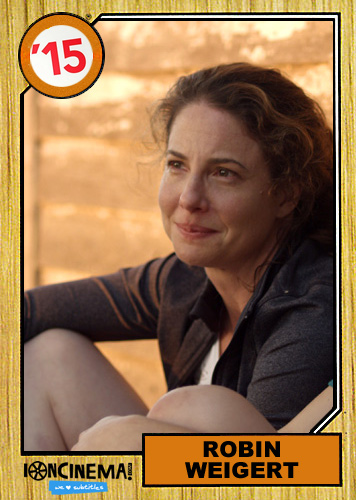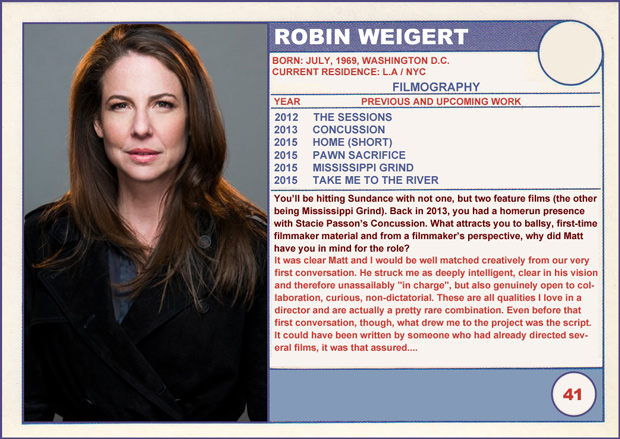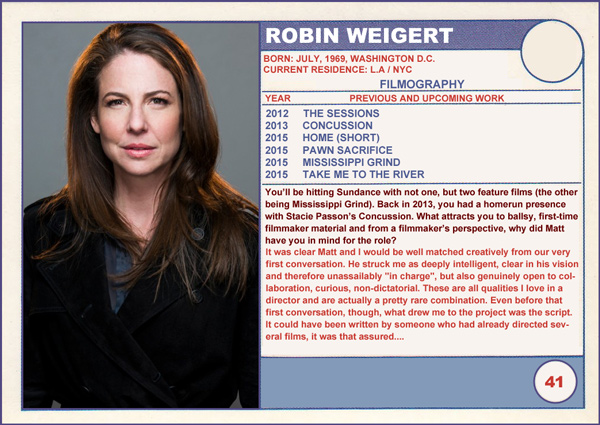Interviews
2015 Sundance Trading Card Series: #41. Robin Weigert (Take Me to the River)
 Eric Lavallee: Name me three of your favorite “2014 discoveries” …
Eric Lavallee: Name me three of your favorite “2014 discoveries” …
Robin Weigert: I’ve become a big jazz fan this year. Its newly my music of choice. I’ve been reading a ton about Russia because of something I’m writing and I’ve been listening to Dave Brubeck, Theloneous Monk, Miles Davis, Bill Charlap. Sort of anomalous, I know, listening to this sound that’s so unbounded and so totally American and reading about gulags, crony capitalism and kleptocracy. I’m at work on something and I don’t exactly know what it is, so I’m just letting instinct take me right now. I think I’m trying to figure out what freedom is, sounds like, feels like. I was hugely inspired by the film Whiplash, which was somehow right on theme for me. True freedom may mean being slave to nothing but your own muse, its true, but that too is slavery. What are we in service of and why? Those may be the only real questions worth asking.
Lavallee: In Take Me to the River, you take on the role of the matriarch presence of the film, but more importantly, the character appears to be the one who does their best to steer the ship from catastrophe. Could you discuss Cindy’s approach to the generational divide as well as, the film’s core themes and how it relates back to your character….
Weigert: Shame disfigures Cindy’s love for her son. She essentially allows him to be put on trial for a crime he didn’t commit because she is over identified with him and believes herself to be so profoundly guilty. None of this is conscious on her part. The guilt she feels is deeply sublimated as painful feelings inculcated in early childhood usually are. The harrowing journey Ryder takes in the film ultimately gives him insight into the source of his mother’s shame. One of the most unique things about “Take Me to the River” is that victory for the young protagonist does not take the form of justice, but of compassion. As a boy falsely accused of indecent behavior, Ryder comes to understand viscerally what it is to suffer the effects of other people’s distorted projections. It is this understanding that allows him to ultimately forgive his mother, who he comes to recognize has also been falsely accused. The “wrong” done to this boy is never righted, but the acute anxiety he is forced to suffer gives him insight into his mother’s anxiety and tempers his adolescent resentment of her fear based decision making. His ordeal, bravely undergone, teaches him something about the source of feminine shame and makes the shaming he routinely has to experience as a gay boy seem less uniquely his cross to bear.
Lavallee: You’ll be hitting Sundance with not one, but two feature films (the other being Mississippi Grind). Back in 2013, you had a homerun presence with Stacie Passon’s Concussion. What attracts you to ballsy, first-time filmmaker material and from a filmmaker’s perspective, why did Matt have you in mind for the role?
Weigert: It was clear Matt and I would be well matched creatively from our very first conversation. He struck me as deeply intelligent, clear in his vision and therefore unassailably “in charge”, but also genuinely open to collaboration, curious, non-dictatorial. These are all qualities I love in a director and are actually a pretty rare combination. Even before that first conversation, though, what drew me to the project was the script. It could have been written by someone who had already directed several films, it was that assured. Every scene felt both inevitable and completely unexpected and the style of the piece was singular and completely immersive. The world depicted was somehow simultaneously intensely familiar and deeply strange to me. It took me back emotionally to my own adolescence. I did not exactly understand what I was resonating with or why, but I trusted that my fairly intense reaction to the material meant I would have something to bring to the character.
Eric Lavallée is the founder, CEO, editor-in-chief, film journalist and critic at IONCINEMA.com (founded in 2000). Eric is a regular at Sundance, Cannes and TIFF. He has a BFA in Film Studies at the Mel Hoppenheim School of Cinema. In 2013 he served as a Narrative Competition Jury Member at the SXSW Film Festival. He was an associate producer on Mark Jackson's This Teacher (2018 LA Film Festival, 2018 BFI London). In 2022 he served as a New Flesh Comp for Best First Feature at the 2022 Fantasia Intl. Film Festival. Current top films for 2022 include Tár (Todd Field), All That Breathes (Shaunak Sen), Aftersun (Charlotte Wells).
































